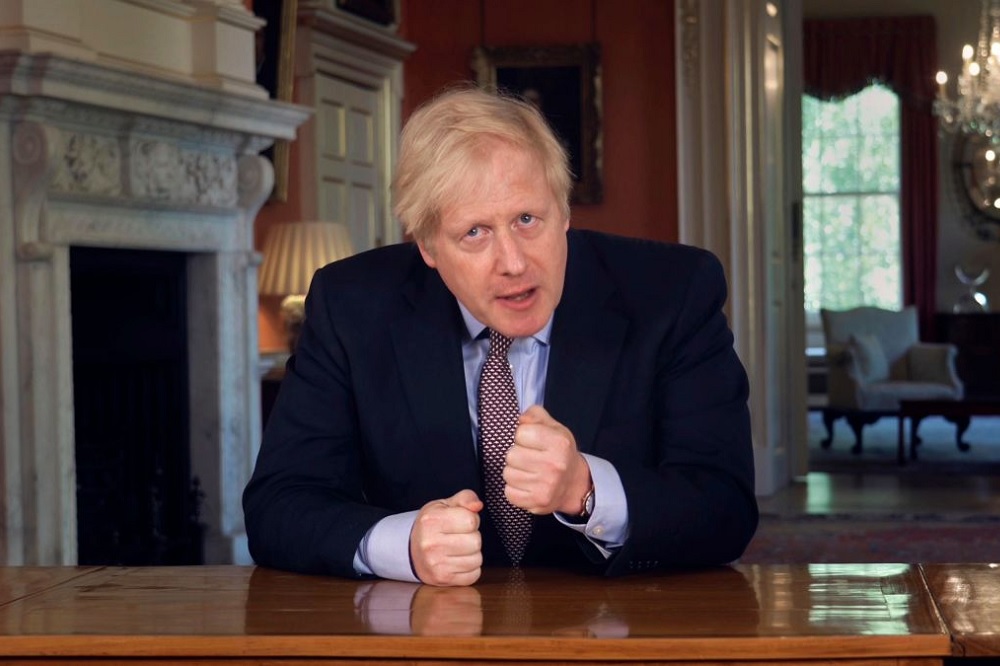Johnson is stuck in a Brexit loop. But it’s 2020, not 2019, and we’re not falling for it

Helen Wales, Chair of Wales for Europe
It was shocking, of course, to see a Cabinet Minister standing up in Parliament and stating that his government was proposing legislation which would break international law.
However, this week’s events and the tactics being deployed by Johnson and co are disappointingly predictable. We’ve seen it before: avoid addressing the complexities of a situation, wait, press the nuclear button, then start pointing the finger at those who disagree with you when the fall-out comes.
After all we’ve been through this year, we deserve better.
This week’s latest move with the Internal Market Bill is unsurprising. Pick a fight with the EU, make them look like the bad guys. Plant the seeds for a showdown with the Lords, possibly the courts, too. Fire a few shots at something else you don’t like while you’re at it (e.g. devolution). Redraw the old battle lines. Deploy a plucky slogan or two.
We saw this almost exactly a year ago with Boris Johnson’s unlawful attempt to prorogue Parliament. High drama and high rhetoric were used to attempt to engineer a grossly disingenuous ‘people vs Parliament’ showdown.
Today’s comments from Johnson are a further classic example. The EU is to blame for an “extreme interpretation” of the Withdrawal Agreement; Parliament is to blame for any shortcomings in the Withdrawal Agreement. MPs who do not fall into line are warned against “squabbling”. Debate, scrutiny and criticism are not a serious part of the process, but deliberately reduced to childish petulance (see also ‘Remoaners’).
We’ve known this was coming all year. For Johnson, a return to arguing over Brexit is seen as firm ground – a very attractive prospect after the quicksand of Covid.
His expectation is that we will all jump up in fury and assume pre-programmed Brexit positions, our political muscle memory will kick into action and the tabloids will see things through. An ironic tactic from a group who were so fond of telling their opponents to ‘get over it’ and ‘move on’.
Loop
But there’s a problem with this strategy.
The problem is that, whilst there may be a smattering of deja vu, this is really not Groundhog Day.
This is 2020, and don’t we all just know it. Things have changed.
For a start, every Conservative MP currently in Parliament voted for the Withdrawal Agreement (of which the Northern Ireland Protocol is a part) on 23rd January; it then became a legally binding international treaty.
Then there’s Covid, of course, causing the current recession and the dire economic forecasts.
There’s the missed opportunity to agree an extension of the Transition Period in June, in the midst of the pandemic.
There’s also the growing support for independence in both Wales and Scotland – not to be taken lightly in a bill that re-centralises power, giving the UK government new spending powers in devolved areas, as well as threatening the capabilities of devolved governments to set standards in those areas.
The process of leaving the EU is already being used to undermine devolution (the current settlement in Wales was, of course, reached after two referenda – more irony), just as many fear it is being used to undermine food and environmental standards and a raft of other protections.
Keeping us stuck in a Leave-Remain loop is an attempt to distract from wider manoeuvres. It’s not working.
The other big change since this time last year is the Conservative General Election victory. But being in government means engaging with the hard details and hard realities. ‘Getting Brexit done’ needs some serious legwork now, not slogans and shock tactics.
Deadlock
Johnson’s attempt to reinstate the battle lines of 2019 needs to be resisted and called out for the cynical, predictable and obstructive move that it is. The growing dissent in the Conservative party is notable and welcome, with criticism from David Melding, John Major, Theresa May and Michael Howard.
Plaid Cymru, the Liberal Democrats, the Green Party, along with the SNP, SDLP, and Alliance Party have already signed an amendment opposing the Internal Market Bill on the grounds that it breaks international law and is contrary to the established devolution settlement. This is to be applauded.
Mark Drakeford and Jeremy Miles have vocally opposed the Bill. We need Welsh Labour MPs to back up the words of their Senedd colleagues in the House of Commons.
The image of Johnson wolfishly stood next to a trap marked ‘Brexit’, waiting for Starmer to step in, has taken hold. But the hard reality is that Labour has vocally opposed leaving the EU without a trade deal for the last four years, and must condemn through voting the breaking of international law, and the threats to the Good Friday Agreement, devolution and the UK’s international reputation.
And we need Conservative MPs in Wales to stand up within their own party and for the manifesto commitments on which they were elected, the loudest of which was to support that ‘oven-ready deal’ (aka the Withdrawal Agreement).
These are the small steps we can take to really begin to break the Brexit deadlock, step out of the loop in which Johnson is clearly trying to trap us, and finally start to deal with the issue of our relationship with the EU like it’s 2020, not 2019.
Support our Nation today
For the price of a cup of coffee a month you can help us create an independent, not-for-profit, national news service for the people of Wales, by the people of Wales.






